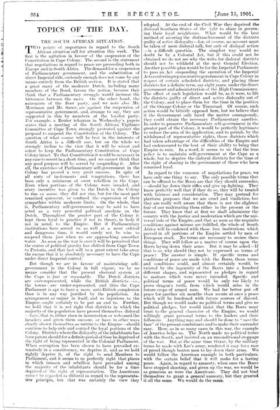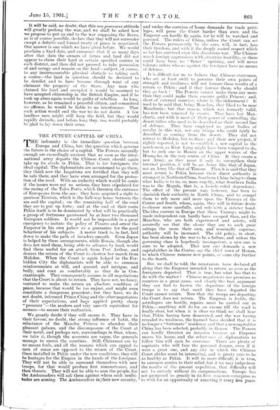TOPICS OF THE DAY.
THE SOUTH AFRICAN SITUATION. TWO points of importance in regard to the South African situation call for attention this week. The first is the agitation in favour of the suspension of the Constitution in Cape Colony. The second is the statement that negotiations in regard to peace are proceeding both in Europe and in South Africa. The demand for a suspension of Parliamentary government, and the substitution of direct Imperial rule, curiously enough does not come by any means entirely from the British section. It is stated that a" great many of the moderate Dutch. including many members of the Bond, favour the notion, because they think that a Parliamentary struggle would increase the bitterness between the races. On the other hand, the extremists of the Boer party, and we note also Mr. Merriman and Mr. Sauer, are against the suspension of representative government, and, strange to say, they are supported in this by members of the loyalist party. For example, a Reuter telegram hi Wednesday's papers states that a meeting of the South African Vigilance Committee at Cape Town strongly protested against the proposal to suspend the Constitution of the Colony. The question of what course will be best in the interests of South Africa is a -difficult one, but on the whole we strongly incline to the view that it will be wisest and , safest to keep the Parliamentary Constitution of Cape Colony intact. To that Constitution it would be necessary in any case to revert in a short time, and we cannot think that any good purpose will be served by suspending it. After an, the existence of Parliamentary self-government in the Colony has proved a very great success. In spite of all sorts of incitements and temptations, there has been only a minimum of overt rebellion, in the Cape. Even when portions of the Colony Were invaded, and every incentive was given to the Dutch in the Colony to rise ea masse, they did not rise, but for the most part remained quiescent, or confined the expression of their sympathies within moderate limits. On the whole, that is, Parliamentary self-government may be said to have acted as a Very powerful political anodyne on the Dutch. Throughout the greater part of the Colony it kept them loyal in practice if not in theory, in hods if not in mind, to the Empire. But if Parliamentary institutions have served us so well at a most critical and dangerous time, it would surely not be wise to suspend them just when we are approaching smoother water. As soon as the war is over it will be perceived that the centre of political gravity has shifted from Cape Town to Pretoria, and that fact will to a great extent take away the excuse that it is absolutely necessary to have the Cape under direct Imperial control.
But though we are in favour of maintaining self- government in the Colony in full vigour, . we by no means consider that -the present electoral system at the Cape is just or reasonable. The Dutch districts are over-represented, while the British districts—i.e., the towns—are under-represented, and thus the Cape Parliament is apt- to have a more - anti-British complexion than is in any way justified by the population. An arrangement so unjust in itself, and so injurious to the Empire, ought certainly to be put an end to. Further, we hold that it is not right that districts in which the majority of the population have proved themselves disloyal —have, that is, either risen in insurrection or welcomed the invaders and given them succour, or have in other ways clearly shownthemselves as untrue to the Empire—should continue to help rule and control the loyal portions of the Colony. Districts where the disloyalty of the inhabitants has 136en patent should for a definite period of time be deprived of the right of being represented in Colonial Parliament. When corruption has been shown to have prevailed ex- tensively in a. constituency, we deprive it, and as we hold rightly deprive it, of the right to send Members to Parliament, and it seems to us perfectly right that places in which treason and rebellion .have prevailed among the Majority of the inhabitants should for 'a* time deprived of the right of representation. The Americans cannot be regarded as illiberal in regard. to the representa- tive principle, 'but that was certainly • the view they adopted. At the end of the Civil War they 'deprived the disloyal Southern States of the ight to share in govern- ing their loyal neighbours. What would be the best method of securing the disfranchisement of the districts guilty of adire disloyalty—for, of course, no account must be taken of mere disloyal talk, but only of disloyal action —is a difficult question. The simplest way would no doubt be by a Colonial Act, but if this could not be obtained we do not see why the writs for disloyal districts should. not be withheld at the next General Election. Another possible plan would be for the Imperial Parliament to pass an Act suspending the operation of the Imperial Acts conferring representative government in Cape Colony in respect of certain' scheduled districts, and placing those districts for a definite term, say eight years, under the direct government and administration of the High Commissioner. The effect of such legislation would. be, as it were, to lift the districts guilty of direct and active disloyalty. out of the Colony, and to place them for the time in the position of the Orange Colony or the Transvaal. Of course, such action would be bitterly opposed here, but we believe that if the Government only faced the matter courageously, they could obtain the necessary Parliamentary sanction. In order to preserve Parliamentary self-government in the greater part of the Colony, it would be perfectly legitimate to reduce the area of its application, and to puuish, by the withdrawal of representative rights, those districts which had taken advantage of the difficulties of the Empire and had endeavoured to the best of their ability to brill°. that Empire to ruin. In a word, it seems to us that the true policy is to maintain self-government at the Cape as a whole, but to deprive the disloyal districts for the time of the right of sharing in the government of those who have remained loyal.
In regard to the rumours of negotiations for peace, we have only one thing to say. The only possible terms that can be offered. to the Boers are that they should surrender, —should lay down their rifles and give up fighting. They know perfectly well that if they do so, they will be treated with fairness and consideration. They may pretend for platform purposes that we are cruel and vindictive, but they are really well aware that there is not the slightest fear of our maltreating them either in the present or the future. They know that at first we shall administer the country with the justice and moderation which are the uni- versal rule of the Empire, and that as soon as the requisite conditions against misuse are fulfilled, the whole of South Africa will be endowed. with those free institutions which prevail in all portions of the Empire settled by men of European stock. No terms are necessary to secure, these things. .Thev will follow as a matter of course upon the Boers laying-down their arms. But it may be asked—If that is so. why should. they-not be expressed as terms of peace' The answer is simple. If specific terms and conditions of peace are made with the Boers, those terms and' conditions could, and almost certainly would,• be twisted by the ingenuity of the Boers into a hundred different shapes, and represented as pledges in regard to matters which were never intended. Specific and political terms of peace would. be only too likely to prove dragon's teeth, from which would arise in the future crops of armed men. We had far better put off peace for another six months than secure at once a peace which will .be burdened with future sources of discord. But though we would make no political. terms and give no political pledges, but would insist that the Boers must trust to the general character of the Empire, we would willingly grant personal terms to the leaders and their followers. Anything may and should be done to " save the face" of the present combatants and to make their surrender easy. Here, as in so many cases in this war, the example of America helps us. The North made no political terms with the South. and insisted. on an unconditional stoppage of the war. But at the same time Grant. by the military terms he made with Lee's army, rendered it easy fora race of -proud though beaten men to lay down their arms. : We would follow the American example in both particulars; with the certain belief that it will make for a lasting peace. Again, in reourd to amnesty; when once the Boers have stopped shooting, and given up the war, we would be as generous. as were the Americans.- They did not-bind themselves to giant a general amnesty, but they granted it all the same. . We would do the same. It will be-said; no -doubt; that this noom possumus attitude will greatly prolong the war, and we shall be asked how we propose to put an end to the war supposing the Boers, as is of course possible; declare that they will not surrender except a definite and formal treaty of peace is negotiated. Our answer is one which we have given before. We would proclaim a fixed date,- and announce that if so many days after. that date the owners of farms and laud did not appear to claim their land at certain specified centres in each district,. and then did not proceed to take possession of and occupy and remain on the landsubject, of course, to any insurmountable physical obstacle to taking such a course—the land. in question should be declared to be derelict and to have become through want of any _clainiant the property of the State. Any man who claimed his land and occupied it would be assumed to have accepted citizenship in the British Empire, and if he took up arms again would be guilty of rebellion. As long, however, as he remained a peaceful citizen, and committed no offence, he would be liable to no interference. That such action would end the war we do not doubt. A few landless men might still keep the field, but they would rapidly dwindle, and before long they, too, would probably be glad to lay down their arms.











































 Previous page
Previous page